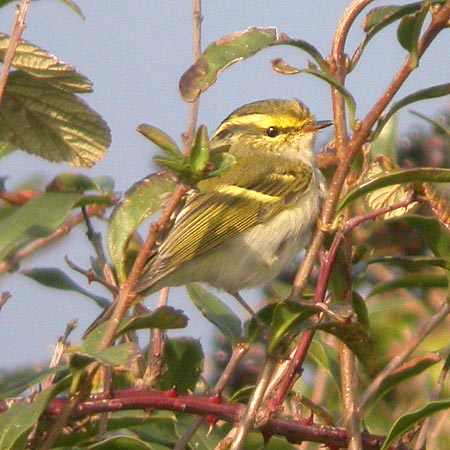m (Redirecting to Pallas's or Lemon-rumped Leaf Warbler) |
(replacing redirect) |
||
| Line 1: | Line 1: | ||
| − | + | ;Phylloscopus proregulus | |
| + | [[Image:Pallass_or_Lemon-rumped_Leaf_Warbler.jpg|thumb|550px|right|Photo by Dave Hawkins]] | ||
| + | Photo Taken: Norfolk, England | ||
| + | ==Identification== | ||
| + | Pallas's Leaf Warbler (Phylloscopus proregulus) is a leaf warbler. This is one of the smallest warblers, and shares greenish upperparts and off-white underparts with typical leaf warblers. However, this is a little jewel of a bird, with prominent double wing bars, supercilia and crown stripe, and a lemon-yellow rump. | ||
| + | |||
| + | ==Distribution== | ||
| + | It breeds in southern Siberia, Mongolia and parts of Tibet and China. It is strongly migratory and winters in subtropical Asia. This tiny warbler is prone to vagrancy as far as western Europe in late October and November, despite a 3000 km distance from its breeding grounds. For example, this species occurs in late autumn in Great Britain regularly enough that it is not classified as rare there. The closely related southern species, Pale-rumped Warbler (or Lemon-rumped Warbler), P. chloronotus, and Gansu Leaf Warbler, P. kansuensis, move to lower latitudes in winter, but do not migrate long distances. | ||
| + | ==Taxonomy== | ||
| + | The Simla Warbler is the westernmost subspecies P. chloronotus simlaensis which may be anything between a distinct species and invalid due to clinal variation (Alström 2006 [2]). These three or four species and the Chinese Leaf-warbler, P. yunnanensis (sometimes P. sichuanensis) were until recently[citation needed] united in the Pallas' Warbler sensu lato. | ||
| + | |||
| + | ==Habitat== | ||
| + | This is a bird of coniferous mountain woodlands. | ||
| + | ==Behaviour== | ||
| + | The nest is built in a tree. Like most Old World warblers, this small passerine is insectivorous. | ||
| + | This bird is not shy, but its arboreal life style makes it difficult to observe. It is constantly in motion, and often hovers briefly, like a kinglet. Its song is powerful and Canary-like. | ||
| + | |||
| + | |||
| + | |||
| + | ==External Links== | ||
| + | {{GSearch|Phylloscopus+proregulus}} | ||
| + | |||
| + | [[Category:Birds]] | ||
Revision as of 00:19, 9 September 2007
- Phylloscopus proregulus
Photo Taken: Norfolk, England
Identification
Pallas's Leaf Warbler (Phylloscopus proregulus) is a leaf warbler. This is one of the smallest warblers, and shares greenish upperparts and off-white underparts with typical leaf warblers. However, this is a little jewel of a bird, with prominent double wing bars, supercilia and crown stripe, and a lemon-yellow rump.
Distribution
It breeds in southern Siberia, Mongolia and parts of Tibet and China. It is strongly migratory and winters in subtropical Asia. This tiny warbler is prone to vagrancy as far as western Europe in late October and November, despite a 3000 km distance from its breeding grounds. For example, this species occurs in late autumn in Great Britain regularly enough that it is not classified as rare there. The closely related southern species, Pale-rumped Warbler (or Lemon-rumped Warbler), P. chloronotus, and Gansu Leaf Warbler, P. kansuensis, move to lower latitudes in winter, but do not migrate long distances.
Taxonomy
The Simla Warbler is the westernmost subspecies P. chloronotus simlaensis which may be anything between a distinct species and invalid due to clinal variation (Alström 2006 [2]). These three or four species and the Chinese Leaf-warbler, P. yunnanensis (sometimes P. sichuanensis) were until recently[citation needed] united in the Pallas' Warbler sensu lato.
Habitat
This is a bird of coniferous mountain woodlands.
Behaviour
The nest is built in a tree. Like most Old World warblers, this small passerine is insectivorous. This bird is not shy, but its arboreal life style makes it difficult to observe. It is constantly in motion, and often hovers briefly, like a kinglet. Its song is powerful and Canary-like.




